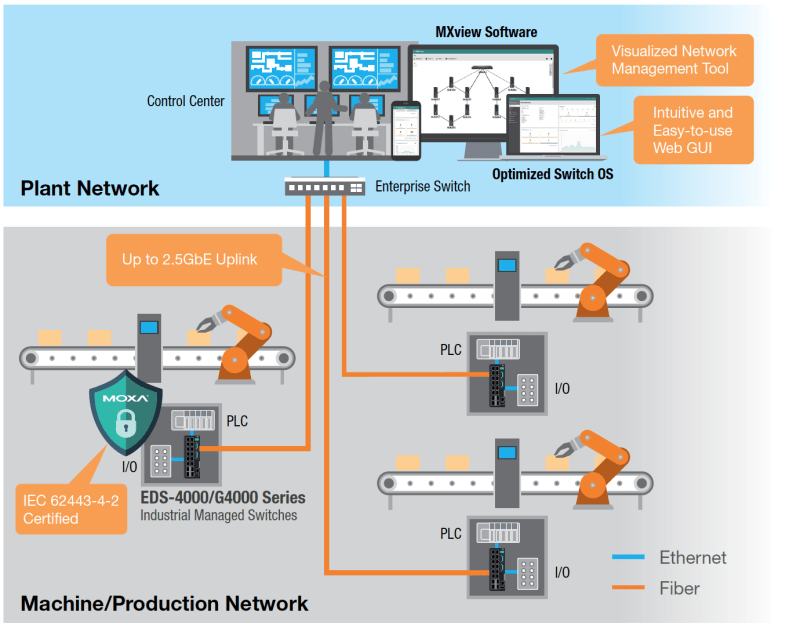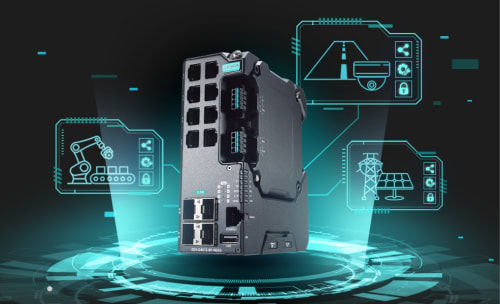Felipe Costa, Product Marketing Manager for Networking & Cybersecurity at Moxa and an ISA/IEC 62443 instructor, introduces industrial control systems (ICSs) and their three main deployment challenges and offers advice for overcoming them with advanced industrial managed Ethernet switches.
Felipe Costa, Product Marketing Manager – Networking & Cybersecurity, Moxa
Industrial control systems (ICSs) are growing in popularity and becoming more integral as industries and organizations continue to adopt Industry 4.0 technologies and other connectivity initiatives. ICSs interconnect arrays of industrial devices and machines and execute efficient automated processes in manufacturing, material handling, and distribution applications. They can even connect multiple devices and machines in different locations.
The two most common types of ICSs are supervisory control and data acquisition (SCADA) systems and distributed control systems (DCSs). Although the definitions may vary and the extent of the differences between them are too complex to address here, DCSs are generally categorized as process oriented and state driven, and SCADA systems are generally categorized as data acquisition oriented and event driven.
Independently of the concepts, ICSs are generally comprised of several components and technologies, which now includes a fusion of operational technology (OT) and information technology (IT). This combination enables greater integration of and more actionable insights into your supply chain, including critical assets, logistics, plans, and processes, which can translate into a significant competitive advantage.
Connecting field devices to an ICS or connecting multiple ICSs in an integrated network allows you to collect device and system data and transform it into valuable information and insights that you can use to optimize your production efficiency and perform predictive maintenance. This can save you money by preventing costly downtime and extending your equipment lifetimes. However, it can also increase the opportunities for internal and external cyberattacks if not performed properly.
To deploy an ICS and ensure the accuracy and integrity of your collected data, it’s vital to have secure, dependable network infrastructure in place and at least one well experienced system engineer. System engineers are responsible for many tasks, including connecting field devices to ICSs so operators can collect and analyze device and system data, defining the best topology, and deploying cybersecurity recommendations. But these processes often aren’t as easy as they may sound, especially as the number of connected devices and system complexity grows.
ICS Network Challenges
System engineers face three primary challenges when deploying ICSs:
- The volume of data being collected, transmitted, and processed grows exponentially with each added device, and many legacy networks simply aren’t built to handle this additional traffic. If they were designed with a certain number of devices in mind and you install additional devices without running a performance evaluation, you could experience poor network performance, bandwidth overload, and broadcast storms, which can result in network latency or packet loss.
- Industrial control systems’ combination of OT and IT technologies significantly increases your susceptibility to cyberattacks and other security threats, which can lead to costly system downtime and lost revenue. In addition, legacy systems are often difficult to protect, and it can be tricky to have your security protocols keep pace with newer technologies, such as cloud computing, big data analytics, and the Industrial Internet of Things (IIoT).
- Without the proper management tools, adding more field devices to your ICS network — and, as such, more device and system data — can make your everyday operations more time-consuming and complex. Automating ICS processes can help free up your system engineers, who might otherwise spend an inordinate amount of time doing status checks.
To set yourself up for ICS success, I recommend futureproofing your network with infrastructure engineered to deliver high performance, trustworthy security features, and ease of use. Although doing so will require some upfront investment, it will also maximize your ICS uptime, ensure its resilience, make it quick and easy for your system engineers to monitor the collected data and your operators to leverage it, and give you a competitive advantage in today’s manufacturing market.

Overcome Network Limitations
You need high bandwidth and advanced traffic control capabilities to support expanding device networks, ensure high-integrity data transmission, and prevent packet loss. To crack this code, you should design your ICS networks to support Gigabit transmission and use link aggregation functions to maximize throughput and, when necessary, combine that with the logical and physical segmentation of the network. This will give you sufficient bandwidth to handle increasing volumes of data. You should also incorporate traffic control functions to ensure that your data can be delivered as requested. High-performance managed switches like Moxa’s EDS-4000 can support 2.5GbE bandwidth and come equipped with the advanced traffic control functions you’ll need to build a futureproof ICS network and optimize your production efficiency.
Safeguard Against Security Risks
The chances that your network will fall victim to a cyberattack increase with every connected device, so you’ve got to design in safeguards from the start. The best way to achieve robust ICS network security is to follow international security standards like IEC 62443, which is one of the most prevalent security standards for industrial automation and control systems. Every Moxa networking device is developed based on the IEC 62443-4-1 secure product development lifecycle guidelines and equipped with additional security features so you can be sure that it will provide a secure foundation for your ICS network infrastructure and reduce your vulnerability. Moxa is also committed to continuously developing new cybersecurity and performance features that allow our customers to continually upgrade their systems at no additional cost.
Streamline Network Management
ICS network connections grow more complex by the day and, without proper management tools, can chip away at your operational efficiency. To help streamline your operations, select network devices that come equipped with intuitive user interfaces and simple network management software. Moxa’s networking devices come with a built-in web GUI that supports at-a-glance status updates and allows you to quickly and easily modify settings as needed. Our networking devices also support a proprietary intuitive management tool that streamlines ICS network management throughout the product lifecycle, from installation through to daily maintenance checks.

Futureproof Your ICS With Moxa and RS
Taking the steps to futureproof your network will maximize your ICS uptime, ensure its resilience, make it quick and easy for your system engineers to monitor the collected data and your operators to leverage it, and give you a competitive edge in today’s manufacturing market.
One surefire solution for futureproofing your ICS network is to employ Moxa’s EDS-4000 Series industrial managed Ethernet switches. These innovative networking solutions are capable of supporting bandwidths up to 2.5GbE bandwidth and equipped with link aggregation functions that maximize network bandwidth for ICS networks, as well as traffic storm control, an ingress data limit, and quality of service (QoS) functions that can make it easier for you to control your traffic flow and deliver your data on demand. EDS-4000 Series industrial managed Ethernet switches are also certified to IEC 62443-4-2 security for industrial automation standards and offer security features including VLAN, IEEE 802.1X, port security, and ACL to reduce the risk of unauthorized access to your ICS networks. In addition, EDS-4000 Series switches feature an intuitive web GUI and support our MXview network management tool, which allows you to visualize the status of networks of all sizes and improve your operational efficiency. They’re even designed to simplify installation and maintenance and feature a compact and rugged design engineered to reliably withstand the hazards of harsh industrial environments.
You can purchase our EDS-4000 Series industrial managed Ethernet switches at RS along with a host of other Moxa products ideal for your ICS installation, including other managed switches and industrial data communications products, PLCs and HMIs, power products, wire and cable, facility security products, and electronic components, such as SFP modules, USB-to-Serial adapters and hubs, antennas, PCIe boards, and optical connectors.
For more information about Moxa’s EDS-4000 Series industrial managed Ethernet switches and other industrial control system solutions please visit the embedded links above or navigate to Moxa’s EDS-4000 Series landing page. For assistance identifying and deploying ICS network solutions that are engineered to accelerate your digital transformation and improve your operational efficiency, please contact your local RS representative at 1.866.433.5722 or reach out to the RS technical product support team.







